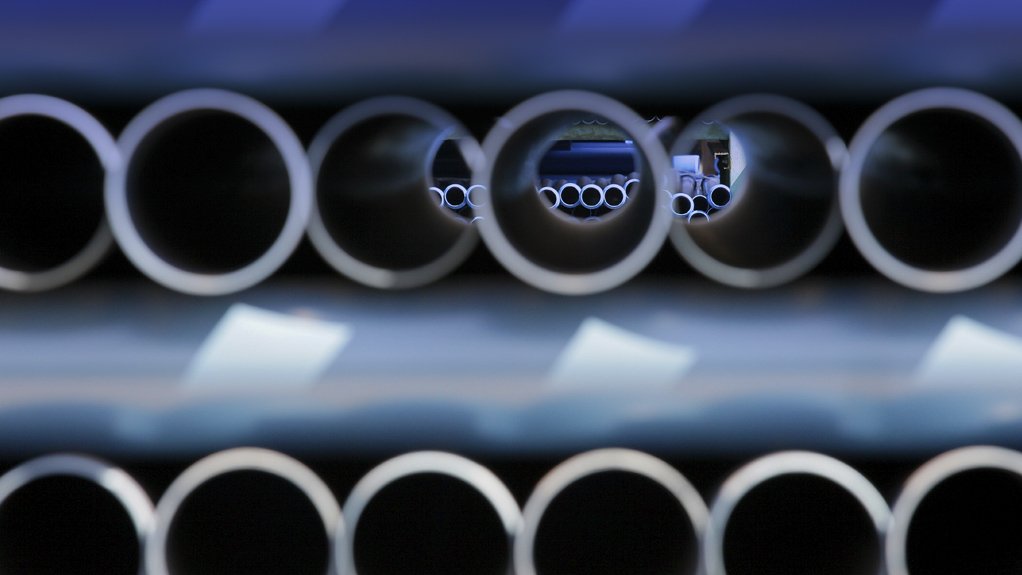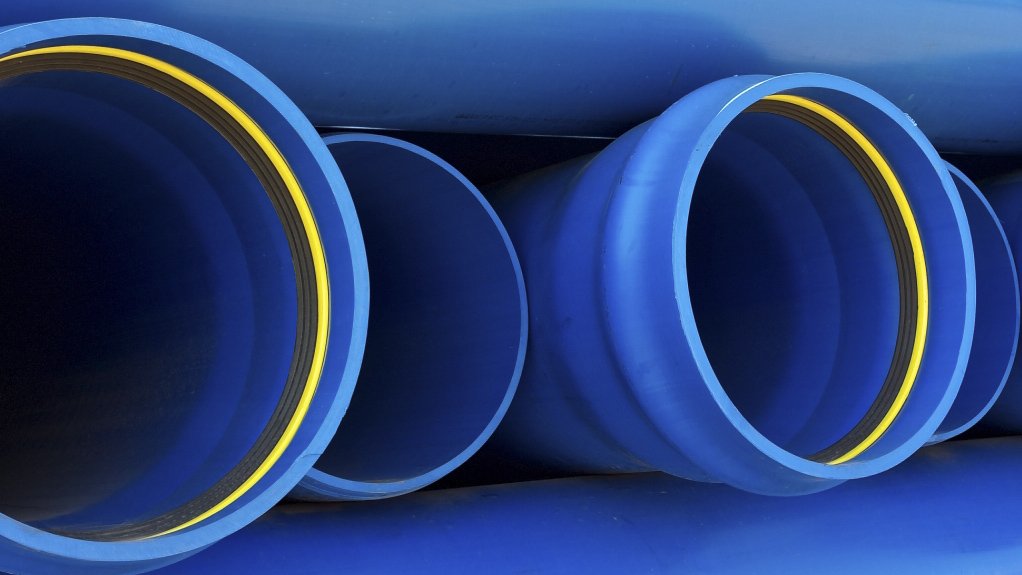Stringent specs for plastic pipes in gas pipelines



HDPE High-density polyethylene pipes are widely used for the distribution of natural gas
GAS PIPELINES South Africa’s gas pipelines are manufactured and installed according to SANS 4437:2014
South Africa’s gas industry is on the cusp of great growth and expansion in light of a potential global oversupply of shale gas. As a result, local plastic pipe manufacturers have to ensure that the pipes used in gas pipelines have been manufactured in accordance with stringent specifications and adhere to global standards, says Southern African Plastic Pipe Manufacturers Association (Sappma) CEO Jan Venter.
Venter explains that the Department of Energy has confirmed the potential development of regional gasfields, which will lead to natural gas becoming a more important fuel in South Africa.
He highlights that natural gas is a clean-burning, more affordable and more secure source of fuel and is increasingly being looked at as an alternative source of energy for both domestic and industrial use.
Venter explains that it burns cleaner than any other fossil fuel, emitting up to 70% less carbon dioxide than coal in electricity generation. A modern gas-fired power plant is also 40% more efficient than a coal-fired plant.
“With the availability of natural gas in neighbouring countries such as Mozambique and Namibia, and the discovery of offshore gas reserves in South Africa, the gas industry in South Africa is set to undergo rapid expansion,” he reiterates.
Developing South Africa’s gas pipelines is expected to unlock significant socioeconomic and environmental benefits for the country.
According to Venter, pipes made from high-density polyethylene (HDPE) are widely used for the distribution of natural gas as they have a well-documented inertness to both the external soil environment and to natural gas.
“Extensive testing has taken place over the last 45 years, confirming time and again that the long-term strength of plastic pipes is unaffected by natural gas and its common constituents – making them the ideal material to use in gas pipelines,” he comments.
Venter has first-hand knowledge of the potential challenges of a pipeline and why it is crucial to ensure that the materials used are up to the task, as he was involved in installing the first gas pipeline in Mozambique using HDPE pipe. An 865 km cross-border, natural gas pipeline was later installed from the Temane gasfields, in Mozambique, to international integrated chemicals and energy company Sasol’s synfuels plant at Secunda in the early 2000, also using HDPE pipe.
“Like water pipelines, gas pipelines are a long-term investment in infrastructure and the pipes and fittings used are therefore required to last in excess of 100 years. HDPE pipes offer numerous benefits for gas pipe installations, such as being lightweight and easy to handle, easy to join, available in a range of sizes and pressure ratings and having low frictional resistance, with hydraulic properties that remain virtually unchanged over its useful life, resulting in lower energy use and pumping costs,” he explains.
Pipes ranging between 20 mm to 630 mm in accordance with SANS 4437 are generally used in gas pipelines.
He points out that one of the biggest dangers of gas pipelines, however, is the risk of rapid crack propagation (RCP) – a rare but significant catastrophic pipe failure that results in a rapidly progressing crack – typically 300 ft/sec when a pressurised pipeline is subjected to a sudden or intense impact. RCP can also be the result of a pre-existing flaw or crack in the pipe and can occur in most piping materials, including steel and polyvinyl chloride pipes.
“RCP is a concern in piping systems that are used to convey compressed gasses, owing to the fact that the rapid energy dissipation from a compressed gas provides the energy required to sustain crack growth,” he explains.
For this reason, pipes bearing the Sappma mark are regularly tested to ensure that they meet and exceed industry standards.
He points out that Sappma is a nonprofit association that represents more than 80% of the plastic pipe produced in South Africa and focuses its efforts on ensuring pipe systems that are correctly designed, leak-free and durable for long-term use, including the rehabilitation of old pipelines.
He says Sappma recently formed a specific task team, headed by plastics manufacturing company Safripol technical support engineer George Diliyannis, who has been tasked with specifically focusing on investigating the requirements of the current specification, compiling a guiding document and, as a member of Sappma, ultimately ensuring the high standards of pipe manufacture and installation when it comes to gas installations.
Diliyannis corroborates that the gas industry is fast growing and Sappma recognises that it has a responsibility in this regard. South Africa has adopted the latest proven ISO standards for gas pipelines made from HDPE. These standards cover materials, manufacturing, installation and testing.
“Specifiers and users should therefore ensure that South Africa’s gas pipelines are manufactured and installed in accordance with SANS 4437:2014 in order to ensure long-term operational safety and pipeline integrity,” he reiterates.
Diliyannis concludes that gas pipelines will increasingly become an important part of the country’s infrastructure. Extended working lifetimes and uninterrupted supply of gas are therefore essential and can only be ensured if the pipes and the pipelines are prime quality.
Article Enquiry
Email Article
Save Article
Feedback
To advertise email advertising@creamermedia.co.za or click here
Announcements
What's On
Subscribe to improve your user experience...
Option 1 (equivalent of R125 a month):
Receive a weekly copy of Creamer Media's Engineering News & Mining Weekly magazine
(print copy for those in South Africa and e-magazine for those outside of South Africa)
Receive daily email newsletters
Access to full search results
Access archive of magazine back copies
Access to Projects in Progress
Access to ONE Research Report of your choice in PDF format
Option 2 (equivalent of R375 a month):
All benefits from Option 1
PLUS
Access to Creamer Media's Research Channel Africa for ALL Research Reports, in PDF format, on various industrial and mining sectors
including Electricity; Water; Energy Transition; Hydrogen; Roads, Rail and Ports; Coal; Gold; Platinum; Battery Metals; etc.
Already a subscriber?
Forgotten your password?
Receive weekly copy of Creamer Media's Engineering News & Mining Weekly magazine (print copy for those in South Africa and e-magazine for those outside of South Africa)
➕
Recieve daily email newsletters
➕
Access to full search results
➕
Access archive of magazine back copies
➕
Access to Projects in Progress
➕
Access to ONE Research Report of your choice in PDF format
RESEARCH CHANNEL AFRICA
R4500 (equivalent of R375 a month)
SUBSCRIBEAll benefits from Option 1
➕
Access to Creamer Media's Research Channel Africa for ALL Research Reports on various industrial and mining sectors, in PDF format, including on:
Electricity
➕
Water
➕
Energy Transition
➕
Hydrogen
➕
Roads, Rail and Ports
➕
Coal
➕
Gold
➕
Platinum
➕
Battery Metals
➕
etc.
Receive all benefits from Option 1 or Option 2 delivered to numerous people at your company
➕
Multiple User names and Passwords for simultaneous log-ins
➕
Intranet integration access to all in your organisation




















